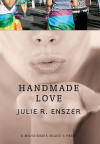Handmade Love
Julie Enszer’s first book of poetry, Handmade Love, embodies the political in a sensual context. This book, printed in a lovely 4×6 format by A Midsummer Night’s Press, centers on themes of relationships, including lesbian marriage and friendships.
Julie Enszer’s first book of poetry, Handmade Love, embodies the political in a sensual context. This book, printed in a lovely 4×6 format by A Midsummer Night’s Press, centers on themes of relationships, including lesbian marriage and friendships.
In “When We Were Feminists,” the first poem in the book, Enszer focuses on the transformation of the narrator’s relationship to feminism from the excitement of first discovery to background, the way a long-term relationship develops elements of routine, and we may forget what we loved so much at the start.
Here is part of the first section of the poem:
When we were feminists, feminism was like cooking the first meal
After grocery shopping. You know:
When all the vegetables have the patina of freshness,
…
When the knife slides through perfectly from the right
combination of resistance and forgiveness.
When you cook with the leisure of a weekend.
Now feminism is like a meal you make five days after shopping,
…
When you cook simply because you have to eat.
And from the last part of the poem:
Even without the pop from the taut skins of fresh grapes,
Without the spray of fresh juice in my mouth, it was good.
And I sat on my bed. And I read a book. It was good like
Picking up a copy of Ms. Magazine at the train station.
I remember how feminism first tasted in my mouth.
In this poem, Enszer uses the plural voice, and brings other people, like the ones she shares communal meals with, into the poem. This connects her to the traditions of feminist poetry, such as Adrienne Rich’s work. Additionally, this strategy establishes the speaker as someone who expresses the perspectives of a generation.
In the first section of Handmade Love, Enszer shows the development of the narrator’s sexual and political identity. The poem “Constantin Brancusi’s The Kiss” becomes Enszer’s statement of her artistic intent. She says:
The easy embrace of these two lovers:
…their lips and eyes meet exactly…
Isn’t that what we all want in a lover?
The perfect match.
The perfect moment
This is what I despise about poems—
the way they isolate
distill life to only the good parts
the never capture this—
harsh words in morning or constipation or warts…
This book does try to capture all of the complexities of relationships, and even contains a villanelle, “Further Evidence,” about a cyst.
The second section of the book contains poems that deal with the concerns of getting older, with poems about marriage between women, the death of friends, and the narrator’s concerns about aging. In “Through the Flower,” a tribute to Judy Chicago, Enszer focuses on her ideas about what old age will be like, though she concedes that she is still, in absolute terms, a long way from old age.
In these poems, Enszer is a teacher in the best way. The penultimate piece, “Was Elizabeth Bishop A Lesbian,” begins with a teacher’s evasion when the poet was a student. Now, she returns to the university as a teacher, “waiting for one young / woman, quite unlike my younger self, / to ask that question again, and the answer; / my answer will change this whole world.” Enszer takes her responsibility as a poet seriously, and has written a book that provides much for readers to consider and discuss.





